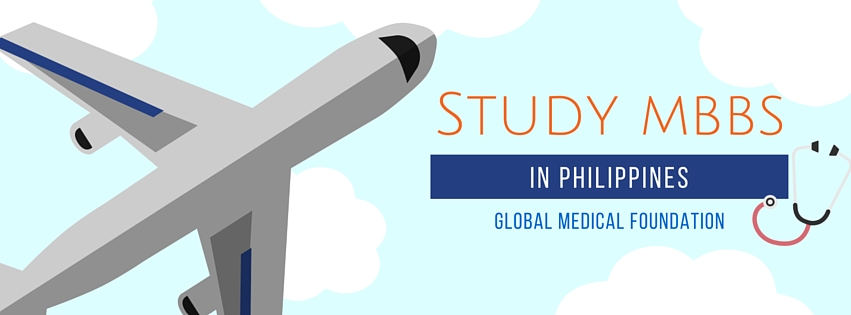BS MD Programs in Philippines
BS-MD from Philippines Frequently Asked Questions

Q1) What is the BS-MD Medical Degree Programme in Philippines?
In Philippines the present education system for their nationals is 10 + 4 where the school education finishes after class 10 and is followed by a BS course for 4 years which is a degree course. After completion of 14 years they are admitted to MD course if he/she wishes to pursue medicine.
An Indian student who has studied in India under the 10+2 system and wishes to study MBBS in Philippines therefore needs to do the BS course before enrolling for MD. However, some additional credits for the BS course are given for +2 which the Indian student has done and the remaining credits of the BS course have to be obtained during the three semesters before he is granted a BS degree. Thereafter he is eligible for MD course.
In short, an Indian student does a BS + MD course of 1.5-2 yrs approx. and 4 years respectively. The system is expected to ease out in the coming years as Philippines is also switching over to 10+2 system.
Q2) What is the MD degree and how is it different from the MBBS programme of India?
Traditionally, in countries which adopt the Commonwealth system of education like India, they use the term “M.B.B.S” (Bachelor of Medicine Bachelor of Surgery) for the medical degrees conferred to the medical students.
As for countries which adopt the American system like Philippines, they use the term “MD” (Doctor of Medicine). However, despite the difference in name, the level of qualification between the two are actually equivalent, and both will allow the holder of the degree to practise as General Practitioners or GPs as long as the country they practise in recognises the university that confers the degree to them.
As for the issue of the word “surgery” being omitted from the “MD” title, as mentioned, the two degrees are actually the same thing. It is just that they use different names in different countries. The curriculum is very much the same; just that the order the lessons are conducted may be in a different sequence compared with the original MBBS course. In the developed countries, both qualify the holders as General Practitioners who are allowed to engage in minor surgery, in the strictest sense of the word “surgery”. Both also allow the holders to further upgrade by attending a post-graduate course and become medical specialists or surgeons.
For a better idea of how the degrees are actually very similar despite differences in title due to the peculiarities of the American vs Commonwealth system, consider the IELTS vs TOEFL, BS vs BSc, SAT vs GCSE, BA vs BBA etc. Despite the differences in name, all the above are generally considered mutual equivalents.
SOURCE: http://www.hcmieducation.com/medicalfaq.htm
Q3) Do I have to sit for an entrance level examination before taking the course?
No entrance level examination is required for the BS-MD course.
Q4) What is the total duration of the course?
The BS-MD double-degree programme lasts for a total of 5 to 5.5 years.
This will consist of theory and laboratory/practical lessons. Towards the end of the programme, students will also undergo clinical rotations or intership when studying MBBS in Philippines, in which they will be attached to selected hospital departments and treat live patients under the guidance and supervision of a practising doctor.
Q5) Where will the clinical rotations be conducted?
The clinical rotations will be conducted in hospitals that are affiliated or associated with each university.
Top students in some of the Universities may also have the opportunity to perform their clinical rotations in overseas hospitals, including those in the USA.
Q6) Is a stipend provided during the clinical rotation period?
No stipend will be paid during the clinical rotation period.
Q7) What is the medium of instruction for MBBS in Philippines?
English is the medium of instruction for all the universities for MBBS in Philippines and English is widely spoken throughout the Philippines. Students can communicate easily in English with the instructors, campus staff, locals, and even patients during the clinical rotations.
Q8) Why choose a university in the Philippines?
- Cutting edge curriculum
- Integrated problem-based learning approach
- English speaking country
- Affordable tuition fees
- Affordable living costs
- Screening test preparation for the licensing examinations required by Medical Councils of the students’ home countries
- USMLE (United States Medical Licensing Examination) test preparation
- Safe environment
- Well established infrastructure in the universities and hospitals
- Excellent boarding and lodging provided by the universities
- International exposure
- Located in the heart of Asia, with easy access to many parts of the world, especially Asia.
Q9) Are the medical degrees from the Philippines Universities recognised worldwide?
Each country will have its own medical governing council or authority, which regulates the country’s healthcare standards and practices.
No matter where you do your degree, you will need to apply for registration with the appropriate country’s medical board and pass the licensing requirements before being allowed to practise medicine in that country. With the exception of selected local universities in the county, no foreign medical degree will entitle you to “automatic” recognition in any country.
However, our graduates are eligible to apply for licensing in places including the USA, the UK, Australia, Canada, India, Nepal, Sri Lanka, Pakistan, Myanmar, most parts of the European Union (EU) and many other parts of Asia.
Q10) Do I have to do BS after graduation?
No, after completing a graduation degree, a student will get admission for the MD course if he meets the eligibility criteria.
MBBS in Abroad!
Have any queries for studying MBBS in Philippines? Write to us! Our counsellor will get back to you shortly.
